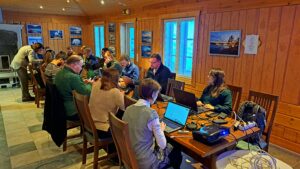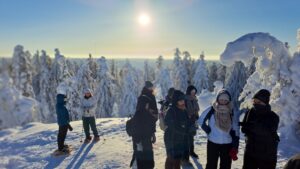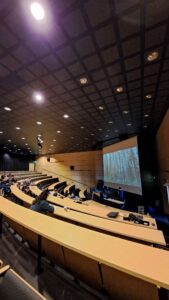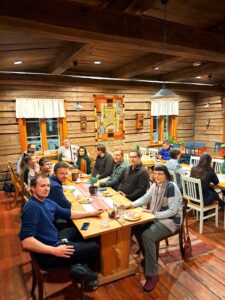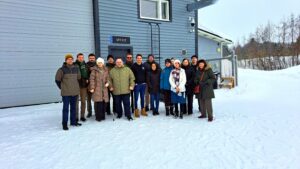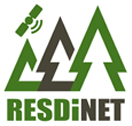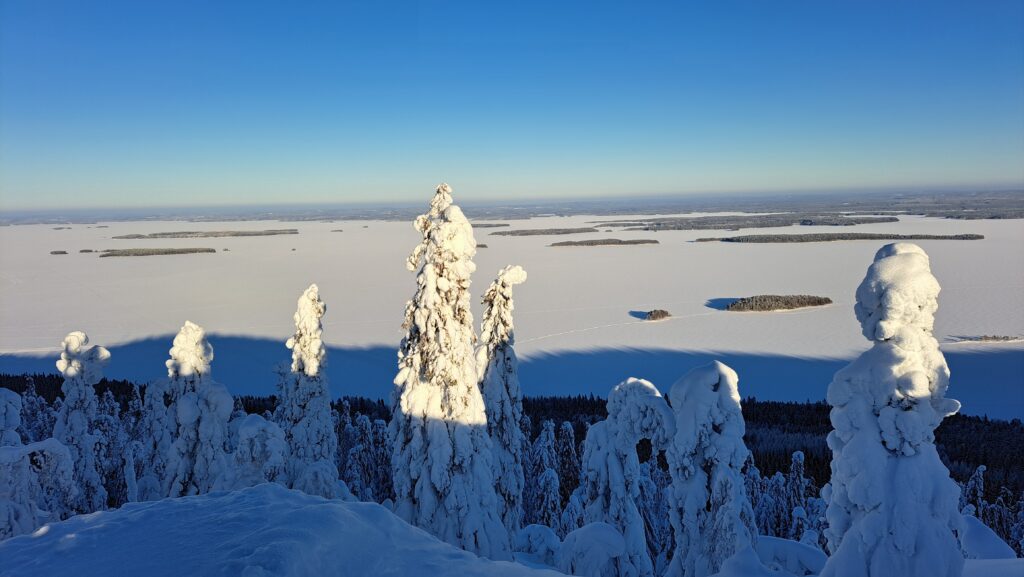Koli National Park, Finland – February 12th – 16th, 2024
The RESDiNET project recently conducted its 2nd scientific workshop at the picturesque Koli National Park in Finland. Despite logistical challenges, including a train strike affecting travel plans, participants from various locations met to explore cutting-edge advancements in remote sensing and forest ecology.
For the second time in the RESDiNET project timeline, team members from the RESDiNET and MULTIRISK projects gathered in the beautiful location of Koli National Park in Finland to participate in a scientific workshop and training on the use of machine learning tools in remote sensing for forest disturbance ecology. The workshop kicked off with a diverse range of activities, including remote sensing data training, field visits to bark beetle monitoring plots, lectures delivered by distinguished world-renowned researchers, and comprehensive project management discussions. Prof. Eija Honkavaara from the Finnish Geospatial Research Institute set the tone with an introduction to remote sensing techniques. She emphasized the importance of monitoring and early detection in bark beetle management, highlighting the structure of remotely sensed data and the methods used to process it within the context of the topics expected to be covered in the anticipated lectures and presentations.
Throughout the event, renowned experts delivered insightful presentations on topics such as machine learning for vegetation health monitoring, high-resolution imaging spectroscopy methods, and mapping dead trees using drones and satellite data. Practical training sessions guided participants in the application of machine learning models, using various data sets including RGB, multispectral, and hyperspectral data.
RESDiNET– MULTIRISK hybrid webinar
The workshop provided a platform to explore emerging technologies and methodologies, such as the use of drones for in-situ assessment of tree health, bark beetle-caused tree mortality patterns, and prediction of outbreak spreading. The RESDiNET and MULTIRISK hybrid webinar, entitled ‘Novel remote sensing technologies, modelling, and in-situ assessment of forest disturbance ecology,’ hosted interesting presentations delivered by project team members from both RESDiNET and MULTIRISK. These presentations featured their most recent research results in the use of remote sensing data and tools to investigate forest disturbances. The discussions not only enriched understanding but also paved the way for future research endeavours.
Training in the Use of Machine Learning Techniques in Remote Sensing for Forest disturbance Ecology
During two says of the workshop Dr. Raquel Alves de Oliveira and Dr. Roope Näsi from the Finnish Geospatial Research Institute provided hands-on training to the participants, guiding them through the process of training machine learning models in Python. They assigned homework tasks to the participants, which involved working with RGB, multispectral, and hyperspectral data.
Visit to Kelluu
The participants visited the headquarters of Kelluu Ltd., a pioneering company specializing in the production of innovative hydrogen-powered airships for remote sensing in land monitoring. Guided by Jiri Jormakka, the Chief Operating Officer of the company, the project team members were provided with a comprehensive excursion, delving into various aspects of airship technology. This included insights into the historical evolution of airship construction, the company’s inception, and detailed technical discussions regarding airship development, operation, and maintenance. Additionally, Jiri Jormakka elaborated on the potential applications of the acquired data for multiple company customers. Attention was given to addressing both domestic and international legal considerations pertaining to the administrative permissions required for organizing flight missions aimed at data collection. Jormakka also shared Kelluu’s strategic plans for market expansion, outlining initiatives to broaden their presence in Finland and across Europe. During the visit, RESDiNET team members had a unique opportunity to observe the preparation and take-off of an airship deployed on an automated flight mission. The company COO introduced “Digital Twins”, an online platform designed to facilitate data processing and analysis for customers. Overall, the visit to Kelluu has not only provided valuable insights but also opened prospects for potential future collaboration, offering new prospects for cooperation data acquisition and analyses for bark beetle induced forest disturbances.
Excursion to the University of Eastern Finland
On the last day of the workshop, Olli-Pekka guided an exciting tour across the campus of the University of Eastern Finland in Joensuu. Participants were introduced to various university buildings, including Natura and Borealis, as well as the wooden building where the research centres of the Natural Resources Institute Finland (LUKE) and the European Forest Institute (EFI) are located. Additionally, participants were shown the laboratory operated by the LUKE, along with chambers equipped with thermal sensors for studying the freezing points of various organisms, including bark beetles. Olli-Pekka provided a tour of the Forest School’s research facilities, showcasing the chemical and soil research laboratories, forest protection and pathology laboratory, and climate chambers utilized for studying bark beetle rearing and the effects of climate change on plant development.
Collaboration, Networking and Engagement
Engaging discussions and collaborative efforts marked the workshop’s progress, addressing key issues such as project management strategies, fieldwork campaign plans, and the development of joint review papers. Notably, significant milestones were achieved, including the approval for the transfer of personnel between institutions and the initiation of administrative procedures to amend project agreements. Amidst enriching sessions, participants had ample opportunities for networking, fostering collaboration, and exchanging ideas. Dinners and outdoor activities provided relaxed settings for informal discussions, strengthening professional bonds and friendship among attendees.
Looking Ahead
As the workshop concluded, participants left with renewed inspiration and a deeper understanding of the intricate relationship between remote sensing technologies and forest ecology. The event’s success underscores the importance of collaborative efforts in advancing scientific research and addressing contemporary environmental challenges.
The RESDiNET project remains committed to pushing the boundaries of remote sensing technologies, forging new partnerships, and contributing to the sustainable management of forest ecosystems. With future endeavours on the horizon, the project continues to chart a path towards innovation and excellence in the field of forest disturbance ecology.
The RESDiNET project team extends heartfelt gratitude to the teams of our partner institutions, notably UEF and NLS FGI, for their outstanding organization, unwavering support, and seamless execution of the workshop events.
Don’t miss out on our machine learning workshop sessions and contributions from RESDiNET and MULTIRISK team members, all available on our YouTube channel: www.youtube.com/@resdinet
Stay updated on our latest activities by following us on our social media channels!
Instagram: www.instagram.com/resdinet
Facebook: www.facebook.com/resdinet
